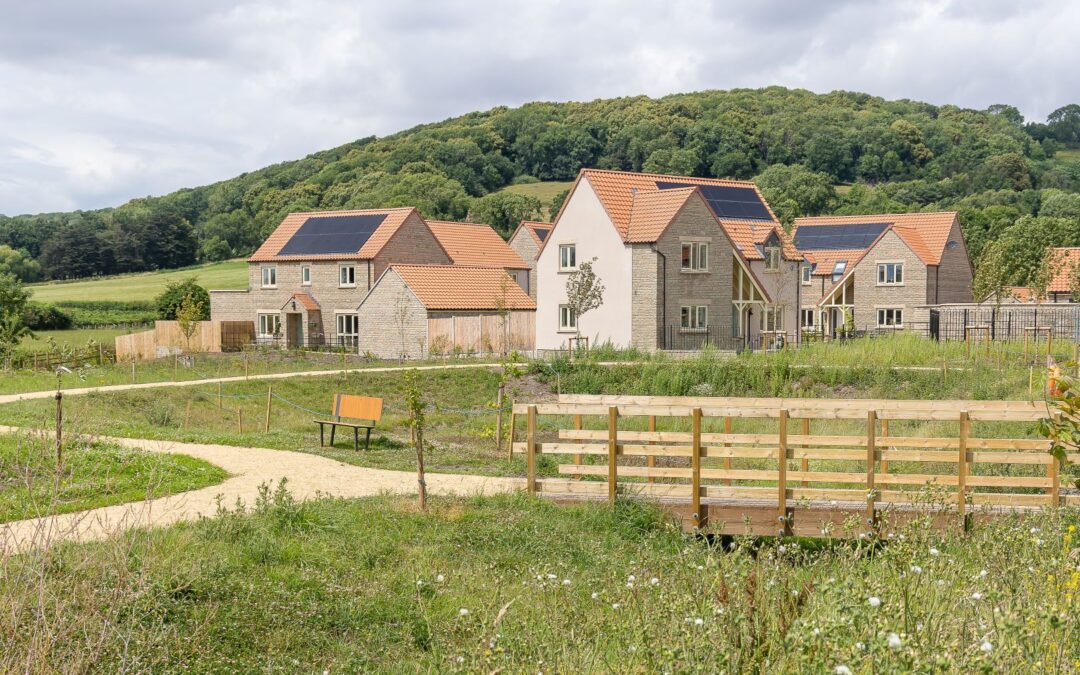Buying a new build home is an exciting venture, offering the promise of a fresh start in a property designed with the latest standards, comfort, and style in mind. From modern layouts and energy-efficient features to the peace of mind that comes with a comprehensive warranty, new build homes are an attractive option for many prospective buyers.
However, the process of purchasing a newly constructed property comes with its own set of unique considerations and steps that might differ from buying an existing home.
We’re here to answer all your burning questions regarding new builds, so you can decide whether it’s the right choice for you and ensure the process is as smooth as it should be.
- What is a new build home?
- What are the benefits of buying a new build?
- What are the stages of buying a new build home?
- What new build buying schemes are available?
- Do new builds come with warranties?
- What is the Consumer Code?
- What should I look out for when conducting a snagging survey?
- New build FAQs
Key takeaways
- New build homes are pristine properties that are built to the latest standards with modern designs and amenities.
- Buying a new home is a smooth process that involves reserving your chosen property, applying for a mortgage, exchanging contracts, carrying out the necessary inspections, and completing
- Numerous schemes are available to help you buy a new build, such as the Deposit Unlock, Shared Ownership, and First Homes schemes
- When buying a new home, you receive a 10-year warranty that covers you for defects and structural issues.
- Before you move-in, you should conduct a snagging survey to ensure your new home is flawless.
What is a new build home?
A new build home refers to a residential property that has been recently constructed and not owned or lived in before. New builds are typically built with modern construction techniques, using quality materials and adhering to the latest building codes and standards. You can find new builds in housing developments, infill developments, or custom built in the buyer’s choice location.
What are the benefits of buying a new build?
Many people often wonder whether buying a new build is worth it and, if you ask us, the answer is yes. There are countless benefits to buying a new build property that make it a popular choice among homebuyers, particularly first-time buyers. From potential cost savings to owning the home of your dreams, here are just a handful of the benefits of buying a new build:
- Personalising your home: New build homes often offer buyers the opportunity to personalise finishes, fixtures, and layouts to suit their tastes and needs
- Cost-savings on renovations: Since everything is brand new, you won’t need to budget for costly renovations or updates for many years.
- Improved energy efficiency, and cost-savings as a result: Modern construction techniques and materials ensure new build homes are highly energy efficient, leading to lower utility bills
- Warranties have your back: New build homes typically come with builder warranties that cover defects and major systems, providing peace of mind for homeowners
- Chain-free transactions: Buying a new build home eliminates the need to deal with property chains, simplifying the purchasing process
- Modern designs: New build homes feature contemporary designs, including open floor plans, stylish kitchens, and advanced home technology
- Lower maintenance: With brand new infrastructure and appliances, new build homes require less maintenance and fewer repairs compared to older properties
- State-of-the-art amenities: Many new builds come with fantastic amenities, both private and communal, such as tennis courts, swimming pools, and coworking spaces
Learn more about the benefits of buying a new build home.
What are the stages of buying a new build home?
1. Research and reservation
The first step to getting your hands on a new build home of your own is to do your research. Investigate builders and developments in the area you’re looking to move to, choose your desired home, and pay a reservation fee to secure it. The typical reservation fee will be around £1,000 but will depend on the property and developer.
Some homes will be readily available to buy, while others will be off-plan properties, which have not yet been built. Learn more about buying off-plan and the process involved.
2. Financial and legal arrangements
Next, you’ll need to apply for a mortgage if you need one and hire a solicitor to handle the legal aspects of the purchase. Mortgages are usually locked in for around three to six months, so just make sure your completion date is within this time. This is particularly important when buying 0ff-plan as there could be delays with construction and your mortgage could no longer be valid.
3. Exchange of contracts
Now, it’s time to sign the contract and pay a deposit to legally commit to buying the property. Your deposit will be roughly 10% of the property purchase price. Explore more about deposits for first-time buyers and how much you’ll need to save before making your first property purchase.
4. Construction and inspections
At this stage, you’ll monitor the construction progress and conduct inspections to ensure quality and address any potential issues. For off-plan new builds, this process can take anywhere between a few months to more than a year, but this should be communicated to you by your developer beforehand. If your developer misses your agreed upon completion date, then you’ll receive compensation accordingly.
5. Completion and move-in
Finally, you’ll need to pay the remaining balance of the purchase price, receive the keys, and take possession of your new home. This completes the transaction!
If you’ve taken out a mortgage, this is when you’ll start making your repayments.

What new build buying schemes are available?
Financial support is available to help you buy a new build home and make getting on the property ladder that little bit easier.
Deposit Unlock
The Deposit Unlock scheme enables first-time buyers and existing homeowners to buy a home with just a 5% deposit for properties values up to £750,000. This scheme was launched by the Home Builders Federation and is only available on new build properties.
The UK government launched the Shared Ownership scheme to enable you to purchase a share of a property and pay rent on the remaining. Overtime, you have the option to buy more shares of the property until you own it outright. Shared Ownership is proving to be a fantastic solution for first-time buyers and a great alternative to renting.
The First Homes scheme is a type of affordable housing designed to help first-time buyers and key workers get on the property ladder by offering 30%-50% discounts on new build properties.
Find out if you could be eligible for affordable housing schemes on your new home.
Do new builds come with warranties?
When purchasing a new build, homebuyers are offered added peace of mind with a 10-year warranty. This warranty acts as a quality guarantee for all homes registered with the National House Building Council. So, should structural defects caused by poor workmanship or faulty materials occur, you’ll be covered for necessary repairs.
New build warranties are typically made up of two parts:
1. A two-year structural defect warranty – covering faulty wiring, plumbing, or windows
2. 10-year structural cover – covering major structural defects such as the roof, load-bearing walls, or property foundations
Learn everything you need to know about new build warranties and find out if you’re covered.
What is the Consumer Code?
The Consumer Code, also known simply as the Code, is in place to improve the new build buying process for homebuyers. This includes setting standards for how home builders market and sell their properties and the post-sale services they offer, which means you’re covered from the moment you reserve your new home up til two years after completion. For example, if you experience severe delays on construction time, you’ll be entitled to a refund on your reservation fee.
What should I look out for when conducting a snagging survey?
Snagging involves flagging minor issues in your new home to your builders, typically minor imperfections such as chipped paintwork or scratched doors. Once your home is fully built, you’ll carry out an inspection to identify these issues. Let your developer know immediately so they can fix them and you can move into a flawless new home.
Exterior snags
- Roofing – loose or missing shingles or tiles
- Guttering – securely-fixed gutters and downpipes, and no blockages
- Walls – cracks or poor brickwork
- Windows and doors – no cracks, scratches, and proper sealing
- Paintwork – no bubbling or peeling
- Driveways and paths – even surfaces and adequate drainage
Interior snags
- Walls and ceilings – no cracks, holes, and smooth finishes
- Floors – even surfaces and properly fitted carpets, tiles, and wood
- Windows and doors – working locks, handles, and hinges
- Electrical – test all sockets, switches, and fittings
- Plumbing – no leaks, good water pressure, and functioning fittings
- Heating – working boiler and radiators
- Kitchen – working appliances, functioning drawers and cupboards, and no defects with worktops
- Bathrooms – sinks, toilets, and shorts properly installed and sealed
- Ventilation – working extractor fans
Here’s our complete guide to snagging surveys for new builds.
Discover your dream new home
Browse thousands of new build properties and discover your dream home today with OnTheMarket. Search new homes for sale.
New build FAQs
Can you negotiate on the price of a new build?
Yes, unlike common misconception, you can absolutely negotiate on new builds. Find out more about how to negotiate on new build homes to get the best possible price and potential freebies.
How much deposit do I need for a new build home?
The deposit amount you need to buy a new home will vary depending on various factors, such as the property price and your credit history. However, you can buy a new home with a deposit as low as 0-5%. Learn more about deposits for first-time buyers and new homes.
When do you pay a deposit on a new build?
When buying a new build, you pay the deposit when you exchange contracts. Before then, you might still need to pay a reservation fee, but this is taken off the total property price at the completion stage.
Do you pay stamp duty on a new build?
Stamp duty tax applies to both existing and new build homes. Want to know how much stamp duty you need to pay? Read our comprehensive guide to stamp duty.
Do new builds appreciate over time?
In the long run, new builds can be just as good an investment as any other property purchase and can grow in value over the years.
Are new builds more expensive?
Property value will depend on market conditions, location, and the property itself, however, new builds can sometimes be more expensive due to the modern features and additional amenities they offer. Use the OnTheMarket new build search tool to find stunning new builds to suit your budget.
Can you extend a new build?
Typically, in order to extend your new build, you’ll first need to obtain written permission from the developer. After a certain period of time, this will no longer be required and you can extend it subject to planning permission. Permissions will vary on a case by case basis, so please contact your developer or refer to your contract for more information.






